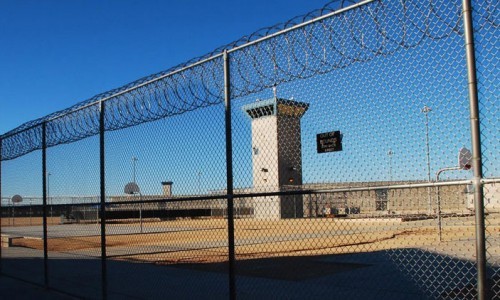The American prison system is rife with money stories. Here are five economic angles you can pursue to localize coverage of prisons and jails in your state or community.
Note: jails and prisons are not interchangeable terms. The Associated Press defines prisons as state or federally run maximum and medium security facilities holding felons for sentences. Jails are local facilities holding people serving misdemeanor sentences or those who are awaiting trial or sentencing.
1. Research the Compensation and Demographics of Corrections Officers
Look at Bureau of Labor Statistics data by state or region to characterize and report on correctional officers and jailers. The BLS provides comprehensive data about these jobs.
For instance, a correctional officer in Mississippi—the state with the second highest incarceration rate—earns some of the lowest hourly wages in the country, $12.71. You can use the BLS’s custom tables function to compare this to data from another geographic region, or even compare it to data for other industries in Mississippi. The Bureau of Prisons also provides demographic data on staffers that could add context to your story.
2. Compare the Costs of Private vs. Public Prison Facilities
The private prison industry is growing. More states are contracting with correctional companies to house inmates and save taxpayer dollars. According to the 2014 Bureau of Justice Statistics’ prison census report, 131,300 inmates were housed in private prisons.
But the question of their effectiveness compared with state-run facilities is still debated. Private prison companies say that streamlined operations and competition makes holding prisoners more efficient.
Are privatized prisons more cost-effective for states? The BJS doesn’t have reliable statistics comparing public and private prisons, but some states have collected their own data.
In a 2015 report, University of Wisconsin-Madison researcher Anita Mukherjee compared the efficiency of prisons in Mississippi. Her research found that the private prisons penalized inmates for infractions while serving which increased inmates’ sentences by four to seven percent. This equaled 60 to 90 days for the average prisoner. The state of Mississippi pays private prison companies per inmate per day, so these minor infractions cost Mississippi taxpayers an extra $3,000 on average per prisoner. What do prisons and elected officials make of the report? What implications could it have on future plans to privatize prisons in your state?
In Arizona the jury is still out. The Arizona Republic explained last fall that public prisons were cheaper per inmate for the state, based on data collected by the Arizona Department of Corrections. Check with your state corrections department, do they collect similar data? What do they say about cost-per-inmate in prisons run by the state compared to those run by private companies?
3. Investigate the Profits of Companies Who Serve Prison Populations
Other private companies that do business with the prison system are also worth investigating. The Center for Public Integrity published a two-part series on the business of services sold to prisoners. The investigative piece looked into financial services companies who provided high-fee services to prisoners and their families during and after a prisoner’s sentence. What other companies are vending to or providing services to prisoners in your state? Check into healthcare and telecommunication services. What is the bidding process for those contracts in your state? What are the impacts on taxpayers, and what are the impacts on prisoners and their families?
4. Explore Inmate Labor and Compensation
According to the Bureau of Prisons, inmates are required to work around the prison in areas like food service or maintenance. Inmates and earn 12¢ to 40¢ per hour for these work assignments.
But many companies use prison labor to produce foods, goods and services for the general public. Whole Foods Market announced last month it will stop selling foods produced by prison labor, after groups protested the decision. The boutique grocery chain came under fire this summer for selling an artisanal cheese in its stores made from prisoner-cultivated dairy. While inmates in programs producing work for private companies are often paid more than those working for the facility, they still earn less than the federal minimum wage, while the companies using prison labor earn huge profits.
Pacific Standard Magazine produced an in-depth article earlier this year about prison work programs in Colorado. Do prisons in your state have similar work programs? What are the impacts on the local economies? What companies are benefiting from prison labor?
5. Cover Post-Incarceration Employment Challenges
The Center for Economic and Policy Research released a study in 2010 highlighting challenges in finding employment by people who have served time, based on data collected by the Bureau of Justice Statistics.
More than 100 cities, counties and states have created “Ban-the-Box” ordinances and laws in recent years. The rule prohibits companies or agencies from requiring applicants to disclose prior criminal history on a job application, leaving background checks for later in the hiring process, after an interview or before an offer is made. Proponents say the question (often a checkbox on job applications) is a barrier to employment and say job seekers should be evaluated by their qualifications first, rather than their criminal history.
Many of these rules also exempt positions where a clean criminal background would be vital to do the job (child care providers, for instance).
The Federal Equal Employment Opportunity Commission updated its guidelines for disclosure on criminal history in 2014 to indicate that some questions of criminal history could violate anti-discrimination laws.
Is there such a ban in your state or community? How do local businesses react to the regulation? How do former convicts find work in your community, and what challenges do they face landing work?











